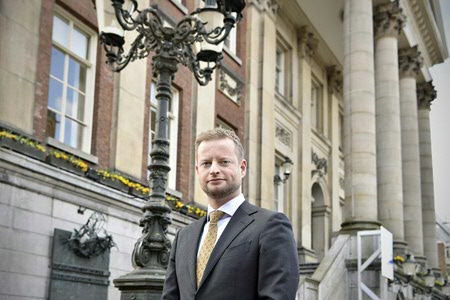Coronavirus breaking the law?

He’s in high demand. The coronavirus is raging in the Netherlands, and Dutch officials need him. Adriaan Wierenga, expert in Public Order Law (Emergency Law), has been answering calls from local authorities wanting to know what quarantine measures they can use to try to contain the virus.
Text: Annemieke van der Kolk, Communication Office. Photos: Elmer Spaargaren
The government on the line
What emergency measures can we, as a municipality, implement? Can we requisition buildings to quarantine people there? Do we have the power to cancel events? As a mayor, am I authorized to make these decisions? These are just some of the questions that Wierenga has received over the last few days from mayors and heads of security regions. ‘They want to know whether and to what extent they can invoke emergency law in certain scenarios. And provinces are getting in touch because they have to supervise the use of these emergency powers.’ The central government is responsible for the control of infectious diseases, Wierenga explains. But maintaining order, including quarantine measures, is the responsibility of mayors and heads of security regions. And they are contacting Wierenga to find out the legalities of doing that in practice.

Emergency
Emergency law is enforced in the event of major public order disturbances and disasters or crises, says Wierenga. In such situations, local authorities can make use of emergency decrees (noodverordeningen) or emergency orders (noodbevelen). Wierenga points out that there is some confusion among administrators regarding the differences between the two powers. ‘Mayors can issue emergency orders on their own initiative. These are instructions that affect specific persons or groups, for a specific case in an acute situation. And it’s also advantageous to have just one person in charge who can take decisive action. An emergency decree, on the other hand, is a temporary emergency law that applies to everyone. That’s why an emergency decree is subject to far greater control mechanisms than an emergency order.’
Misuse of emergency orders
‘The tendency that I see in practice,’ Wierenga continues at a rapid pace, ‘is that mayors regularly issue emergency orders for prolonged periods of time. This creates a kind of temporary legislation, without the necessary safeguards. One of the safeguards that is circumvented is the direct democratic control of the municipal council. So the emergency order is being misused.’ Wierenga and his colleague Brouwer write about this fundamental difference between an emergency order and an emergency decree in case law journals. ‘These are read by judges and lawyers, and the great thing is that we have noticed that the judiciary is monitoring more closely whether administrators are implementing this distinction properly. This enables us legal scholars to directly influence the rule of law when it comes to emergency law.’

Around the table with mayors
You might just shrug your shoulders and think that emergency law isn’t actually used all that often in the Netherlands. But you would be mistaken, corrects Wierenga. ‘Individual municipalities don’t use it very often, but on a national level it is used every week. And it’s precisely because municipalities don’t use it very much that they know little about it.’ Which explains all the phone calls to Wierenga. And they’re not all just about the coronavirus or anti-Black Pete demonstrations. Last week, he was sat around the table with three mayors to discuss how to deal with the farmers’ protests. Others contact him to find out whether they can detain nuisance asylum seekers. And on the Dutch Safety Board, he works alongside Tjibbe Joustra and Jeroen Dijsselbloem to investigate the safety risks involved in New Year’s Eve celebrations.
Living the dream
Wierenga really isn’t exaggerating when he says that he’s ‘living the dream’. There’s no doubting his commitment to his profession when he quickly but carefully chooses modest words to explain this passion: ‘The opportunities that I have to shape my research and teaching put me right at the heart of the social sphere. Working in this field, which concerns people’s health and lives, gives me meaning. Take this book, for example,’ Wierenga continues as he walks to the shelf to grab a copy of his book Naar handhaafbare noodbevelen en noodverordeningen (Towards enforceable emergency orders and emergency decrees). Part 84 in the ‘Politiekunde’ (Policing) series in Dutch academic journal Politie & Wetenschap. ‘When I was at the Police Academy yesterday for a lecture, I saw two copies in their library. And I’m proud of that, because emergency services, security regions and municipalities actually consult this book.’
At the heart of society
Wierenga clearly believes that exposing legal malpractices and guaranteeing the fundamental rights of citizens is an important task. ‘If we legal scholars notice that municipalities are abusing emergency powers, we challenge them by publishing a critical article. You never really know what kind of an impact that will have, but sometimes, for example, questions are then asked in Parliament about it and a pattern changes. That’s always great to see.’ Wierenga doesn’t have to go looking for a connection to society; society knows where to find him. No doubt he’ll have another call from a mayor some time soon.
Contact
More news
-
08 December 2025
Colourful Characters: Bert Röling
